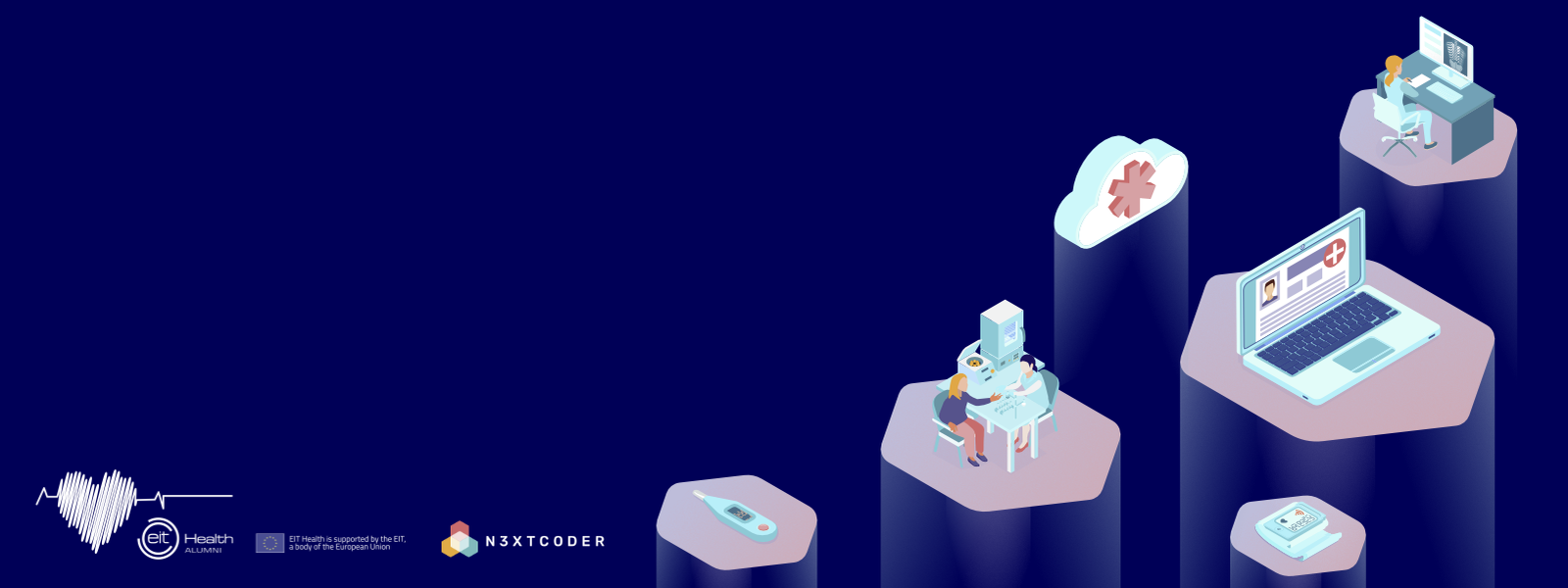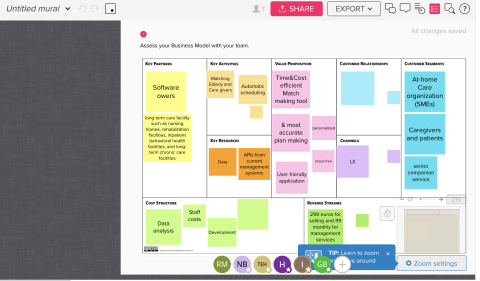Building Resilient Societies: EIT Health Alumni Hackathon

EIT Health Alumni Network organised their first inclusive digital hackathon bringing together innovators and patients on the topic of ‘Building Resilient Societies’.
Over the course of 8 hours, more than 40 participants, competed for a EUR 3 000 cash prize from EIT Health and a tailored product lab from N3xtcoder. A package designed to help them take the next steps in their health entrepreneurial journeys with solutions that deliver what really matters to European citizens.
The goal of this hackathon was to scale early stage projects that offered inclusive innovations for a healthier, more caring European society. At a time where our global society is combatting an international pandemic, EIT Health’s goals to support stronger healthcare systems are now more prevalent than ever. In particular, those activities which integrate and build upon the contribution of empowered citizens and patients.
The EIT Health Alumni Hackathon is the proof bringing together creative minds always pays off. This is the opportunity for Alumni to harness their talent and work together on developing innovative ideas and inclusive solutions for a healthier society.
Urszula Bogatynska, Jury member, EIT Representative to the EIT Alumni Board
Five projects were selected to be scaled throughout the day. Each was paired with a carefully crafted interdisciplinary team made up of entrepreneurs, innovators, students, health professionals, and patients, all eager to put their creativity to the test, and claim victory in the first ever EIT Health Alumni Hackathon.
The five projects selected to compete included:
- Team Simplit: A unique device which dispenses medicine accurately and effectively. Your medication on time, every time.
- Team Canary Sentinel: An affordable, personalised early warning system to monitor for early signs of COVID-19 symptoms with the use of a phone camera.
- Team Kiora: Digital Cognitive based therapy for those living with mental disorders with the help of ‘the DOC’, a personal AI assistant.
- Team VIA: Rethinking how we deal with grief and death with the creation of a website with online spaces for memories, learning, sharing, and counselling.
- Team Taktify: An intelligent resource planning system for healthcare workers and at home care systems.
I was working with a start-up called Via, helping those to navigate the grieving process from the passing of a loved one. With a growing conversation about mental health and the ubiquity of life online, Via was a very relevant and exciting project to work on. I was really impressed by the variety of skills that we had in our team; web development, UX designers, legal experts, and engineers. It was great to see everyone fall into place, taking a role that they had some expertise in and outputting some amazing work.
Ben Hayward, Mission Desgin at Aerospacelab. Participant of Team Via
The involvement of patients
EIT Health firmly believes that societal impact is constructed from the connection between innovation and society and measured against what really matters to people. Building on EIT Health’s commitment to Citizen & Patient Engagement, the inclusion of citizens and patients, and taking heed of their recommendations and experiences, was thus central to the hackathon. This provided an invaluable level of insight and expertise to the teams, as members were able to understand the outcomes that matter to their target audience, learn from lived experiences, and understand how working with patients’ is essential for good intentions to become impactful and successful businesses.
Keeping the patient in mind is crucial when solving such problems. Ultimately, they will be the end beneficiary of this solution. Patients have been through these health problems and experienced all their symptoms and consequences. If our end goal is patient health and quality of life, it is only logical to include the patients at as many points within the design cycle of the solution. I was glad to see that projects included patients not only in the research phase but also in the ideation, design, and prototype.
Nour Maalouf, Medical Doctor, Participant of Team Kiora
The Hackathon was held entirely on Discord, a tool originally intended for online gamers, but which offers many of the functions required for an online hackathon such as this. The multiple chat functions allow teams, most of whom have never met each other and live hundreds of miles apart from one another, to work together effectively towards a common goal.
The Hackathon was a great experience and opportunity to promote patient involvement in health innovation'.
Phil Collis (European Heart Network Patient Representative)
Meet the winning team!
Each team presented their initial idea to the external jury panel at the very start of the day, highlighting the key aspects of their project and outlining the challenges they would like to work on. At the end of the 8-hour sprint, the five teams then presented their ideas once again to the jury, this time focussing on the developments made throughout the day and reflecting on the new perspectives they gained through teamwork in such as short space of time.
From prototype apps, to functioning websites and bootstrapped data analysis tools, the jury had a lot of results to assess. In the end the decision was unanimous: Team Canary Sentinel were declared the winners!
Their project is based on creating an affordable, personalised early warning system to monitor for early signs of COVID-19 symptoms with the use of a phone camera.
The winning team worked on three clearly defined work packages throughout the day:
- Data analysis and statistics related to the funding and data required for their AI.
- Bioengineering and privacy.
- Working and collaborating with healthcare systems. This detail orientated approach clearly paid off as the team’s final pitch was strong enough to convince the Jury of their potential and win them a spot in the N3xtcoder personalised Product Lab.
The hackathon allowed for inclusive co-creation of e-health solutions. It also gave the opportunity for designers, coders, and entrepreneurs to understand the experience, the needs and the expertise of patients and citizens before designing solutions. This experience could be a beginning of a 'new way of doing business'. The challenge lies in creating a culture of patient and citizen partnerships, establishing the leadership and organisational context required to foster engagement, and building bridges between the highly technological digital culture, the still largely academic medical knowledge and the experiential patient knowledge.
Anne Schweighofer, Jury member, CEO of the Patient Conseil
Going Forward
The winning team: Canary Sentinel have already entered into discussions with N3xtcoder to design the perfect product Lab to take their idea forward. They will have access to all of N3xtcoders team of marketing, coding, and business development experts, and will be further supported by an additional EUR 3 000 from EIT Health. Already in June, Canary Sentinel met with a Data Security Expert Alistair, iOS Expert Marius, and Software Engineer Jennifer from the N3xtcoder team to discuss how best to advance the project. Over the course of a series of weekly sprints, the team will now work on developing a more advanced protoype.



 Share this page
Share this page


